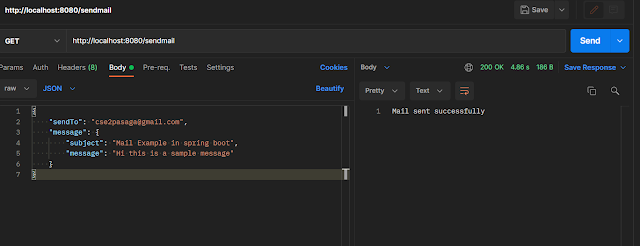Maven dependency
<?xml version="1.0" encoding="UTF-8"?>
<project
xmlns="http://maven.apache.org/POM/4.0.0"
xmlns:xsi="http://www.w3.org/2001/XMLSchema-instance"
xsi:schemaLocation="http://maven.apache.org/POM/4.0.0 https://maven.apache.org/xsd/maven-4.0.0.xsd">
<modelVersion>4.0.0</modelVersion>
<parent>
<groupId>org.springframework.boot</groupId>
<artifactId>spring-boot-starter-parent</artifactId>
<version>2.5.6</version>
<relativePath />
<!-- lookup parent from repository -->
</parent>
<groupId>com.example</groupId>
<artifactId>Springboot-mailSender</artifactId>
<version>0.0.1-SNAPSHOT</version>
<name>Springboot-mailSender</name>
<description>Example for Mail sending in Spring Boot</description>
<properties>
<java.version>1.8</java.version>
</properties>
<dependencies>
<dependency>
<groupId>org.springframework.boot</groupId>
<artifactId>spring-boot-starter-mail</artifactId>
</dependency>
<dependency>
<groupId>org.springframework.boot</groupId>
<artifactId>spring-boot-starter-web</artifactId>
</dependency>
<dependency>
<groupId>org.springframework.boot</groupId>
<artifactId>spring-boot-starter-test</artifactId>
<scope>test</scope>
</dependency>
<!-- https://mvnrepository.com/artifact/org.projectlombok/lombok -->
<dependency>
<groupId>org.projectlombok</groupId>
<artifactId>lombok</artifactId>
<version>1.18.22</version>
<scope>provided</scope>
</dependency>
</dependencies>
<build>
<plugins>
<plugin>
<groupId>org.springframework.boot</groupId>
<artifactId>spring-boot-maven-plugin</artifactId>
</plugin>
</plugins>
</build>
</project>
Create Model Class
Let's create the model class. We have used the Lombok library to reduce boilerplate code such as getter and setter, tostring.
Annotating the POJO model class with the @Data annotation will include @ToString, @EqualsAndHashCode, @Getter / @Setter, and @RequiredArgsConstructor.
import lombok.Data;
@Data
public class MailMessage {
private String sendTo;
private Message message;
}
import lombok.Data;
@Data
public class Message {
private String subject;
private String message;
}
Create Mail service
We will use the spring JavaMailSender interface to send mail. The JavaMailSender supports MIME messages. The MimeMessageHelper class handles the creation of JavaMail MimeMessages, including attachments, etc.
import java.io.IOException;
import javax.mail.MessagingException;
import javax.mail.internet.MimeMessage;
import org.springframework.beans.factory.annotation.Autowired;
import org.springframework.mail.javamail.JavaMailSender;
import org.springframework.mail.javamail.MimeMessageHelper;
import org.springframework.stereotype.Service;
import com.example.demo.model.MailMessage;
@Service
public class EmailService {
@Autowired
private JavaMailSender javaMailSender;
public void sendEmail(MailMessage mailMessage) throws MessagingException {
MimeMessage msg = javaMailSender.createMimeMessage();
MimeMessageHelper helper = new MimeMessageHelper(msg, true);
helper.setTo(mailMessage.getSendTo());
helper.setSubject(mailMessage.getMessage().getSubject());
helper.setText(mailMessage.getMessage().getMessage());
javaMailSender.send(msg);
}
public void sendEmailWithAttachment(MailMessage mailMessage)
throws MessagingException, IOException {
MimeMessage msg = javaMailSender.createMimeMessage();
MimeMessageHelper helper = new MimeMessageHelper(msg, true);
helper.setTo(mailMessage.getSendTo());
helper.setSubject(mailMessage.getMessage().getSubject());
helper.setText(mailMessage.getMessage().getMessage());
// helper.addAttachment("add attachment here", bds);
javaMailSender.send(msg);
}
}
Add properties for Mail sender
The following properties should be added to the application.properties file.
#logging
logging.level.root=info
#Mail
spring.mail.host=smtp.gmail.com
spring.mail.port=587
spring.mail.username=your mailid
spring.mail.password=password
spring.mail.tls=true
#spring.mail.properties.mail.debug=true
spring.mail.properties.mail.transport.protocol=smtp
spring.mail.properties.mail.smtp.connectiontimeout=5000
spring.mail.properties.mail.smtp.timeout=5000
spring.mail.properties.mail.smtp.writetimeout=5000
# TLS , port 587
# SSL, post 465
#spring.mail.properties.mail.smtp.socketFactory.port = 465
#spring.mail.properties.mail.smtp.socketFactory.class = javax.net.ssl.SSLSocketFactory
spring.mail.properties.mail.smtp.starttls.enable=true
spring.mail.properties.mail.smtp.auth=true
spring.mail.properties.mail.smtp.ssl.trust=smtp.gmail.com
Create Controller
Now let's create a GET endpoint to send mail which takes the request body containing the message, subject, and receiver mail id.
import javax.mail.MessagingException;
import org.springframework.beans.factory.annotation.Autowired;
import org.springframework.http.ResponseEntity;
import org.springframework.stereotype.Controller;
import org.springframework.web.bind.annotation.GetMapping;
import org.springframework.web.bind.annotation.RequestBody;
import com.example.demo.model.MailMessage;
import com.example.demo.service.EmailService;
@Controller
public class SendMailController {
@Autowired
private EmailService emailService;
@GetMapping(path = "/sendmail")
public ResponseEntity<String> sendMail(@RequestBody MailMessage mailMessage) throws MessagingException {
System.out.println("Request body " + mailMessage);
emailService.sendEmail(mailMessage);
return ResponseEntity.ok().body("Mail sent successfully");
}
}
Let test our code by sending mail id and message, subject in the request body. Open Postman and send the request.
full code can be found at the GIT repository.



